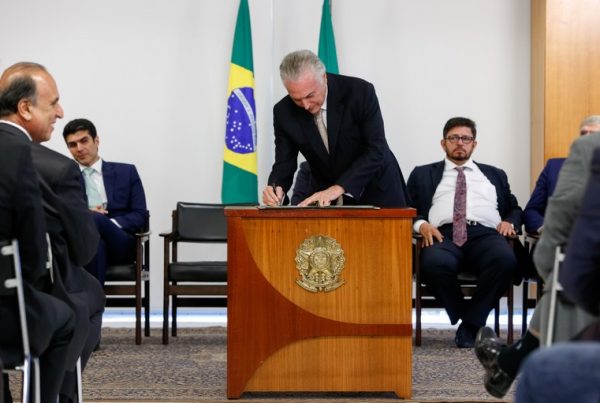A lobbying battle is under way in Brazil over a potential hike in mining royalties later this year.
(Matéria publicada pela Metal Bulletin: http://www.metalbulletin.com/Article/2994591/Search/RESOURCE-NATIONALISM-Miners-battle-to-block-hike-in.html?PageId=196010&Keywords=cfem&OrderType=1)
Mining companies have enjoyed a historically low rate of royalties since 1967, but despite this they say the tax burden is equivalent to about 35% of their sales revenues.
For example, the iron ore royalty is 2%, as opposed to 4% in Australia and 4.6% in the USA.That may change soon.
Last September, the Brazilian mining and energy minister Edison Lobão said royalties for all kinds of ores would rise.
On top of that, new regulations would be imposed on the mining industry, he said, with a limit on the number of years allowed for mine exploitation, possibly 35 years, and other controls over concessions.
“There´s a lot of speculation about what the new mining code will specify. Very few people had access to the review. What everybody believes, whether royalties [are raised or not], is that fiscal surveillance [on projects] must increase,” said Ricardo Marcatto, corporate relations director at Fioito, a consultancy firm specialising in mining royalties.
The federal government is considering the issue, but no decision is likely to be announced until after the results are out for this October’s municipal elections.
The Brazilian mining association, IBRAM, is lobbying hard against any rise in royalties.
“We are against increases of any kind in the tax burden. Brazil already has a very high tax rate. Paying more means losing out in competitiveness,” IBRAM director Rinaldo Mancin said.
If the hike in royalties came with a sweetener, such as exemption from other taxes, then the industry would be prepared to negotiate, Mancin conceded.
On top of that, new regulations would be imposed on the mining industry, he said, with a limit on the number of years allowed for mine exploitation, possibly 35 years, and other controls over concessions.
“There´s a lot of speculation about what the new mining code will specify. Very few people had access to the review. What everybody believes, whether royalties [are raised or not], is that fiscal surveillance [on projects] must increase,” said Ricardo Marcatto, corporate relations director at Fioito, a consultancy firm specialising in mining royalties.
The federal government is considering the issue, but no decision is likely to be announced until after the results are out for this October’s municipal elections.
The Brazilian mining association, IBRAM, is lobbying hard against any rise in royalties.
“We are against increases of any kind in the tax burden. Brazil already has a very high tax rate. Paying more means losing out in competitiveness,” IBRAM director Rinaldo Mancin said.
If the hike in royalties came with a sweetener, such as exemption from other taxes, then the industry would be prepared to negotiate, Mancin conceded.
Royalties and payments
Mining royalties are calculated on the gross value of sales, less logistical and insurance costs.Payments for mining royalties, also called CFEM (financial compensation for exploiting mineral resources), are divided between the federal government (12%), the state government where the mineral is extracted (23%), and the municipal government for the mine’s location (65%).Due to infrequent and inadequate inspections, companies can have some trouble keeping up to date with CFEM. Vale, for example, recently lost a court battle concerning CFEM payments because of delays in inspection reports.
“Vale was just the first. Many companies face the same problem with CFEM payments,” a tax consultant said.
Vale has been negotiating a sum related to the CFEM payments with Brazil’s National Mineral Production Department (DNPM). The government is claiming Vale owes a total payment of up to 7.88 billion reais ($4.37 billion), but the company is disputing this figure.
It has made provisions of 225 million reais for the CFEM payment.
Other proposals
“Vale was just the first. Many companies face the same problem with CFEM payments,” a tax consultant said.
Vale has been negotiating a sum related to the CFEM payments with Brazil’s National Mineral Production Department (DNPM). The government is claiming Vale owes a total payment of up to 7.88 billion reais ($4.37 billion), but the company is disputing this figure.
It has made provisions of 225 million reais for the CFEM payment.
Other proposals
Two other bills are being debated by the Brazilian chamber of deputies and senate.One bill, proposed by senator Flexa Ribeiro, urges a change in the way CFEM is calculated. Instead of being based on net revenues, the bill says the tax should be based on the company’s gross sales, which would reduce tax evasion, according to Ribeiro.The second bill, proposed by deputy Carlos Brandão, calls for a 10% export tax to be imposed on iron ore.
Currently, iron ore carries no export tax. Brandão argues that by an export tax on iron ore would spur producers to invest in steelmaking inside the country.
However, despite the talk of higher taxes, Brazil remains open to foreign investment, with no restrictions on foreign involvement in the country, insiders point out.
Carolina Guerra
cguerra@metalbulletin.com
Currently, iron ore carries no export tax. Brandão argues that by an export tax on iron ore would spur producers to invest in steelmaking inside the country.
However, despite the talk of higher taxes, Brazil remains open to foreign investment, with no restrictions on foreign involvement in the country, insiders point out.
Carolina Guerra
cguerra@metalbulletin.com



